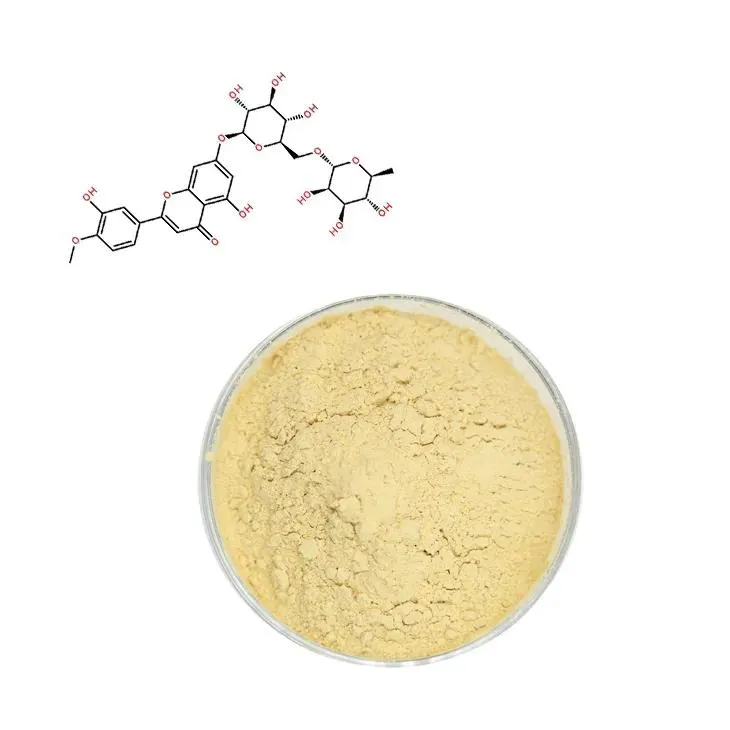- 0086-571-85302990
- sales@greenskybio.com
Is diosmin FDA approved?
2025-07-14

In recent years, the quest for health improvement has seen individuals increasingly turn to dietary supplements and natural remedies. Diosmin, a flavonoid found in various plants, has emerged as a popular option, particularly noted for its potential benefits in vascular health. With mounting interest, questions arise regarding its regulatory status and whether it holds approval by the U.S. Food and Drug Administration (FDA). This article seeks to clarify the FDA approval status of Diosmin, detailing its recognized uses, benefits, and implications for consumers.
What is Diosmin?
Diosmin is a naturally occurring flavonoid, commonly sourced from citrus fruits, notably oranges. It has been used for decades in Europe as part of treatments for conditions related to vascular functioning and chronic venous insufficiency (CVI). The main therapeutic focus of diosmin revolves around its ability to improve vein health by strengthening vascular walls and reducing inflammation, which helps alleviate symptoms such as swelling, varicose veins, leg pain, and hemorrhoids.
Beyond its vascular benefits, some studies have explored diosmin’s antioxidant properties, suggesting potential applications in reducing oxidative stress and supporting cardiovascular health overall. However, its primary recognition remains within the context of vein and circulatory improvement.

FDA Approval: Clarifying the Status
One of the critical aspects consumers and healthcare providers consider when choosing supplements is whether these products have received FDA approval. As of current knowledge and regulatory guidelines, diosmin itself, as a standalone active ingredient or supplement, is not directly approved by the FDA for treatment or cure of medical conditions. The FDA does not approve dietary supplements in the way it does pharmaceutical drugs. Instead, it regulates them under different standards, focusing on safety and accurate labeling rather than efficacy as it would for prescription medications.
Several products containing diosmin are marketed as dietary supplements in the United States. These products fall under FDA regulation concerning their manufacturing quality, safety standards, and labeling accuracy. As dietary supplements, they are not approved to make specific therapeutic claims regarding disease treatment or prevention without substantial evidence. Therefore, while diosmin may not be FDA-approved in the medical drug sense, it is regulated concerning its quality and consumer safety when marketed as a supplement.
Clinical Uses and Efficacy
Despite the lack of FDA approval in strict medicinal terms, diosmin has been used clinically, often in combination with other compounds like Hesperidin, another flavonoid commonly derived from citrus fruits. Together, these compounds are frequently used in formulations for treating chronic venous insufficiency, hemorrhoids, and lymphatic health problems.
Clinical studies primarily in Europe and other regions have reported positive outcomes, including reduction in leg swelling and pain, improved venous tone, and overall relief from the symptoms of venous insufficiency. Although promising, these findings have not been conclusively established across broader regulatory frameworks like the FDA. Therefore, medical use outside dietary supplementation typically requires professional healthcare oversight.
Considerations for Consumers
1. Consultation: Before taking diosmin or any supplement for health improvement, consumers are advised to consult healthcare providers. This ensures that any supplement aligns with individual health needs and does not interfere with prescribed medications.
2. Quality and Source: When choosing diosmin supplements, prioritize products from manufacturers who adhere to good manufacturing practices and offer transparency regarding sourcing and ingredient composition.
3. Realistic Expectations: While diosmin may offer benefits, it’s essential to maintain realistic expectations regarding its efficacy. Supplements should complement a broader health strategy rather than serve as sole remedies.
Safety and Potential Side Effects
Generally, diosmin is considered safe when used as directed in supplement form, with minimal adverse reactions reported. Potential side effects are typically mild and may include gastrointestinal disturbances such as nausea or diarrhea. As with any supplement, individual reactions can vary, and any adverse symptoms should prompt discontinuation and medical consultation.
The Path Forward: Research and Development
Ongoing research into the benefits of diosmin continues, and as scientific understanding enhances, regulatory perspectives may evolve. More robust clinical trials conducted under rigorous frameworks can contribute to a clearer picture of diosmin’s potential medical applications and any expanded recognition by regulatory bodies such as the FDA.
Conclusion
In conclusion, while diosmin does not possess FDA approval in the context of drug treatment, its presence in the dietary supplement market is firmly regulated to ensure consumer safety throughout manufacturing and labeling practices. Its recognized benefits, particularly in vascular health, make it an appealing option within complementary health strategies. As research progresses, diosmin's role in health enhancement may further solidify, offering insights into more structured regulatory pathways and comprehensive applications. Consumers, guided by informed choices and professional advice, can effectively navigate diosmin's uses to align with broader health objectives.
- ▶ Hesperidin
- ▶ Citrus Bioflavonoids
- ▶ Plant Extract
- ▶ lycopene
- ▶ Diosmin
- ▶ Grape seed extract
- ▶ Sea buckthorn Juice Powder
- ▶ Fruit Juice Powder
- ▶ Hops Extract
- ▶ Artichoke Extract
- ▶ Mushroom extract
- ▶ Astaxanthin
- ▶ Green Tea Extract
- ▶ Curcumin
- ▶ Horse Chestnut Extract
- ▶ Other Product
- ▶ Boswellia Serrata Extract
- ▶ Resveratrol
- ▶ Marigold Extract
- ▶ Grape Leaf Extract
- ▶ New Product
- ▶ Aminolevulinic acid
- ▶ Cranberry Extract
- ▶ Red Yeast Rice
- ▶ Red Wine Extract
-
Curcumin
2025-07-14
-
Propolis Extract Powder
2025-07-14
-
Clove Powder
2025-07-14
-
Ivy Extract
2025-07-14
-
Shikone Extract
2025-07-14
-
Angelica sinensis extract
2025-07-14
-
Saponin Extract
2025-07-14
-
Sea buckthorn Juice Powder
2025-07-14
-
Tongkat Ali Extract Powder
2025-07-14
-
Curcumin Extract
2025-07-14





















